Planning a wedding? Ready to pull your hair out trying to figure out what wedding roles you need to fill and who should occupy them?
You’re not alone. It’s definitely something that causes lots of brides and grooms anxiety, mainly because the social engineering of making such decisions is stressful. (For most of us, anyway.)
But that’s ok – we think once you understand exactly what the responsibilities are of each member of your wedding party, it’ll help you navigate the waters of filling those wedding roles.
That’s why we’ve put together this guide to wedding roles, responsibilities, and tips for how to choose wisely.
But first…
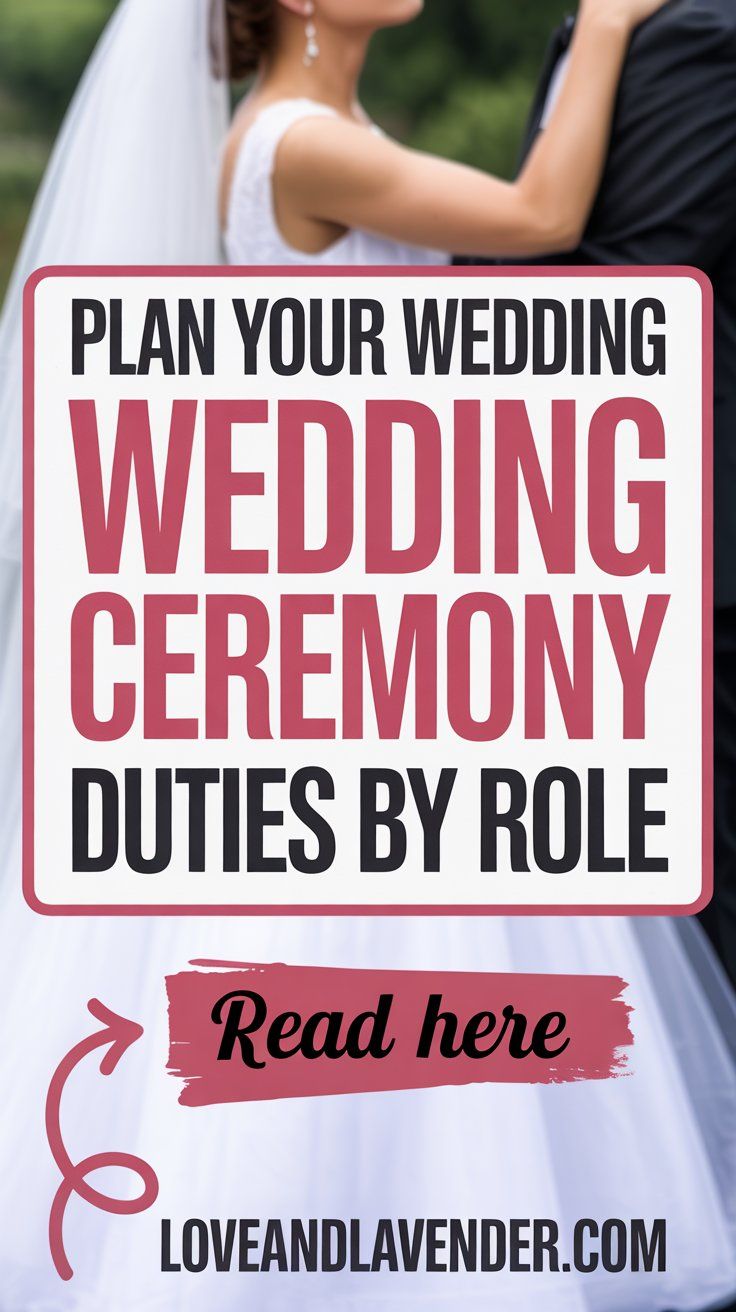
Do I Even Need A Wedding Party?
Thaaaaat all depends upon how big your shindig will be.
Suppose you’re hosting a cute micro wedding in the backyard or an intimate gathering at a small venue? In that case, you may not need ushers and attendants and whatnot.
You may have already decided to keep the wedding party short and sweet or avoid one altogether, and that’s A-Okay. The purpose of a wedding party is to assist and divide the many responsibilities that go into a sizable event, so if your event isn’t sizable, don’t worry about it.
Unless you want to, of course. In which case, read on.
Responsibilities For Everyone
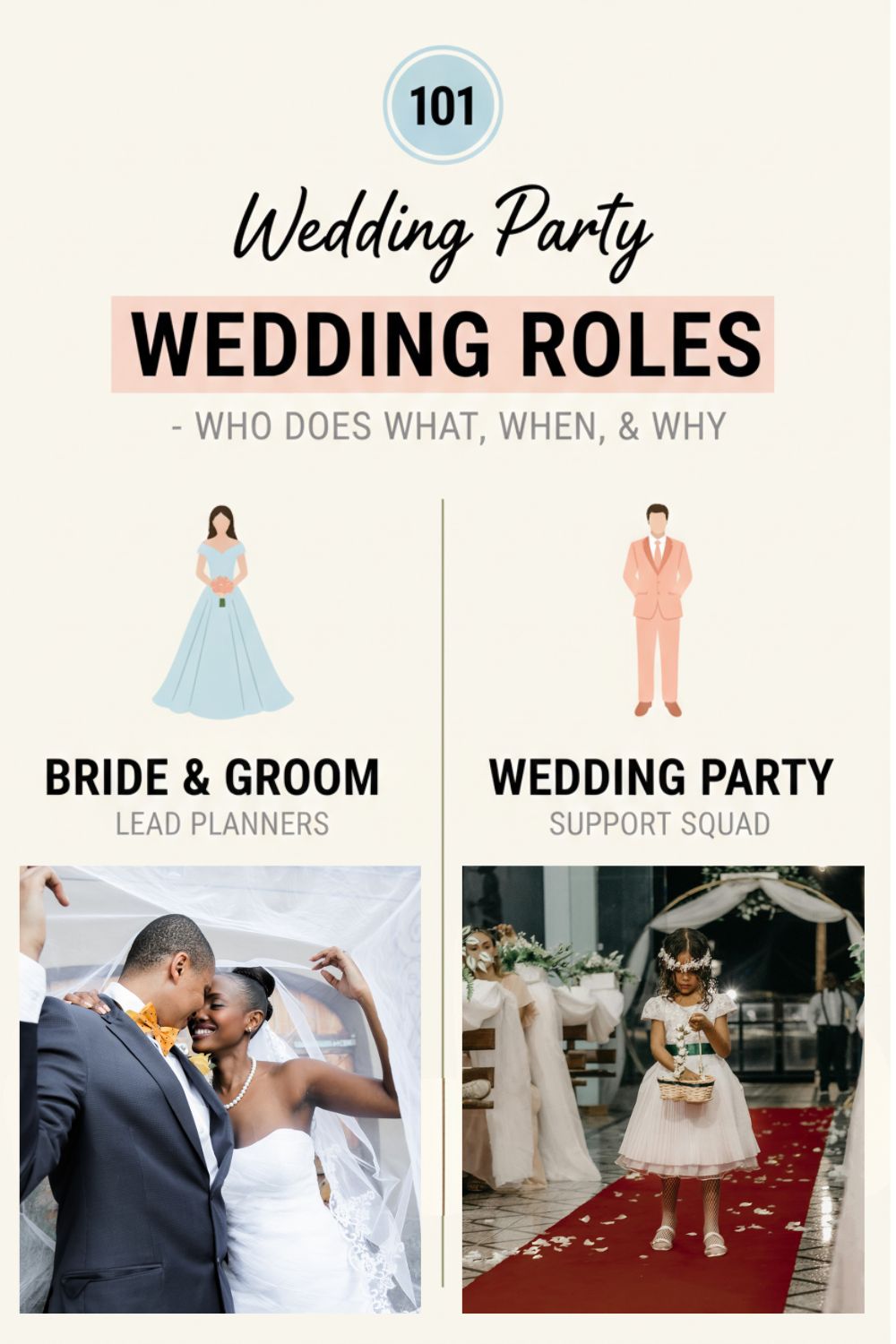
Even though members of your wedding party will have responsibilities unique to their roles, there are some things that multiple individuals should chip in and help with.
These responsibilities often begin well before the big day and continue throughout the shindig until it’s time to take off those shoes that are killing you and go home.
Planning and Hosting
Members of the wedding party usually host pre-wedding parties like the engagement dinner, showers, bachelor and bachelorette parties, etc. But they should also be ready to help you find vendors, taste cake, handle invitations and RSVPs, pick out wedding décor, and much more.
It takes a village, people.
Attire Shopping
Traditionally, everyone in a wedding party wears coordinating stuff or special occasion attire that requires some shopping. Your wedding party should be prepared to get their own threads, either as a group (bridesmaids and groomsman, for instance) or solo.
Rehearsal
There may be some people in the wedding party who won’t need to come to the rehearsal, but if your ceremony is a planned presentation, most wedding party members need to practice their part for the ceremony.
Besides, there will likely be a rehearsal dinner afterward with beverages and dessert. Everyone loves beverages and dessert.
Pre-Ceremony Prep
No bride is an island. She’ll need her squad to help her get into the dress, do hair and makeup, bring her champagne, etc., all before she even thinks about walking down the aisle.
The groom may need help in this department, too. But let’s face it, the bride probably needs it more.
Also, let’s not forget the moral support and damage control.
Words of encouragement can go a long way for a nerve-wracked bride and/or groom. Chances are, they’ll both need that.
Unfortunately, things can (and often do) go askew on the wedding day. There aren’t enough chairs, the flower girl threw up on her dress – the possibilities are endless. Your wedding party are the perfect folks to recruit for putting out any fires that may arise. (Hopefully, that doesn’t include a literal fire.)
Pictures
Everyone in your wedding party should be ready for pictures. Whether it’s convening after the ceremony for official pics, or candid shots throughout the wedding prep, you’ll treasure those pictures forever. They’re an essential part of the experience.
Common Wedding Roles in Traditional Ceremonies
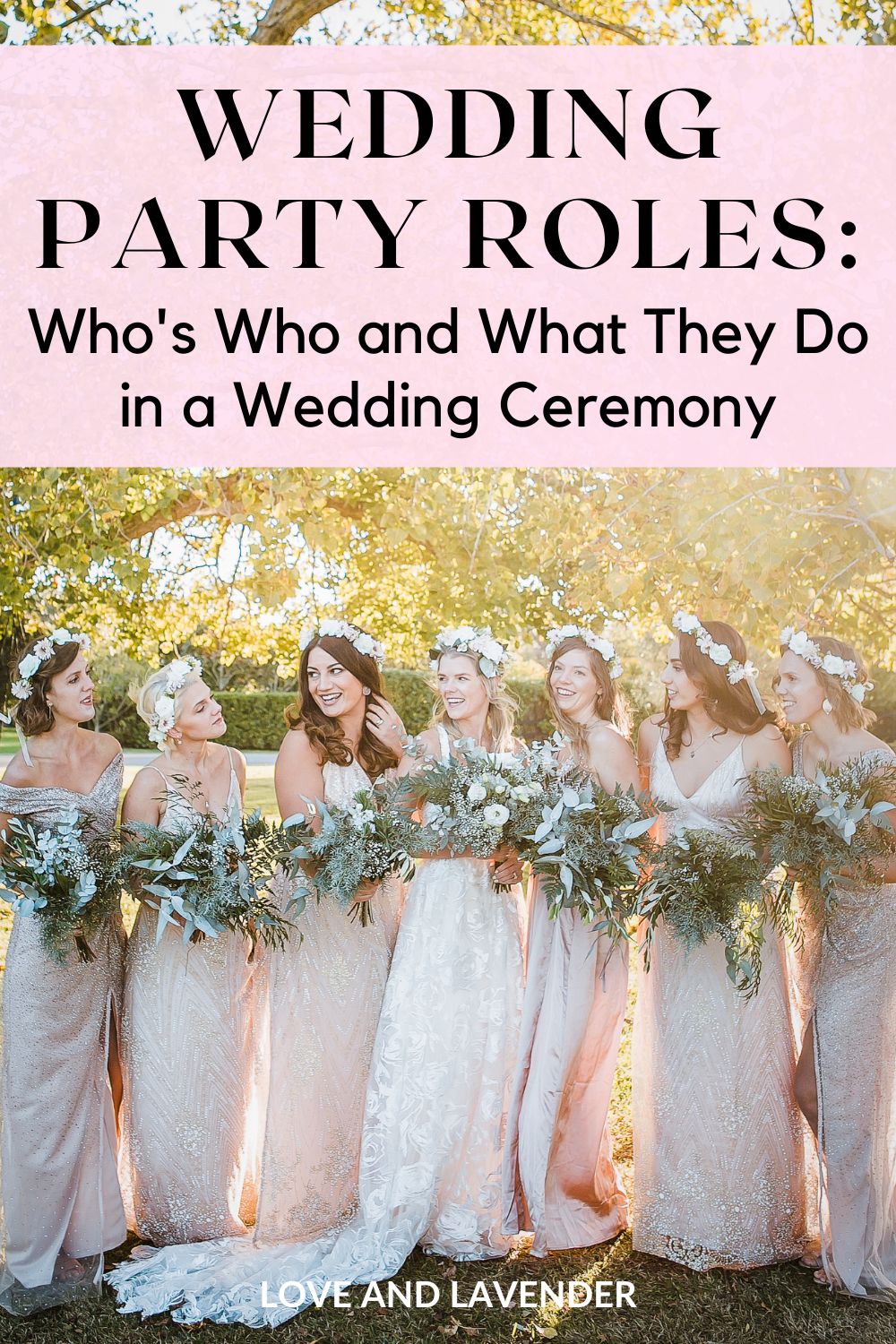
Let’s get to the question on everyone’s mind first, shall we?
Who Pays For The Wedding?
You’ll notice we haven’t assigned this very, very important responsibility to any one person/group here. That’s because times are a-changin’ and the bride’s parents don’t have to be held solely responsible for paying for the wedding anymore.
Now, if the bride’s parents want to stay traditional about it, fantastic. Problem solved.
Otherwise, it’s a good idea for the bride and groom to communicate with the appropriate persons (usually the parents) about the very *minor* detail of divvying up the bill. That includes any portion the bride and groom will pay, if applicable.
Bride and Groom Responsibilities
Some things aren’t suitable for anyone but the bride and groom to take care of. These shared responsibilities include:
- Budget planning
- Choosing a date and location
- Meeting with and paying the officiant
- Acquiring and paying for each other’s wedding bands
- Writing vows
- Choosing maid of honor/bridesmaids and best man/groomsmen
- Choosing wedding party attire
- Compiling a guest list
- Sending thank-you notes after the wedding’s over (although you may be able to recruit help from friends and family for that one)
Traditionally, the groom is expected to make a speech right after the bride’s father at the reception, but it isn’t required.
Parent(s) of the Bride
Traditionally speaking, the bride’s parents are expected to send out engagement announcements and host the engagement party.
The bride’s parents host the wedding and wedding weekend activities such as brunches and gatherings for the guests.
They usually stay until the reception is over to say goodbye to guests and handle payments for any applicable extras like parking attendants, coat-check, entertainment, the bar, etc.
The bride’s mother is a great secondary contact for vendors, planners, and anyone else involved in the wedding operations. She also should play a key role in helping with any issues around gift and registry details. She’s a great point person for handling the floral decorations/arrangements, too.
She’s also involved in bridal gown shopping, arranging and attending dress fittings, and arranging the hair and makeup appointments for the bridal party.
At the wedding, she assists in preparing the bride for the ceremony. Sometimes the mother-of-the-bride will deliver a speech at the reception, but not always.
The bride’s father is expected to escort her to the ceremony and down the aisle. He’ll deliver a speech accompanied by a toast at the reception, too.
Both the bride and groom’s parents should help with the guest list, offer moral support, and pick up planning slack as needed. They’re are also responsible for choosing (and getting fitted for) the formalwear they’ll don for the wedding.
Parent(s) of the Groom
In addition to the responsibilities shared with the bride’s parents we listed above, the groom’s parents are traditionally expected to foot the bill for the rehearsal dinner the night before the wedding.
If the families aren’t well acquainted yet, the groom’s parents are usually the first to reach out and organize a gathering for them to get to know each other.
If applicable, they coordinate with the bride’s parents about wedding expenses and travel arrangements and greet the guests upon their arrival at the ceremony.
Maid/Matron of Honor
Now here’s where wedding roles and their responsibilities can help you decide who to appoint if you’re having a hard time.
The maid of honor has lots of responsibilities and she can expect to be quite busy throughout the wedding planning and execution. If you’re on the fence about who your maid of honor should be, keep that in mind.
She must coordinate the activities involving the bridesmaids, including but not limited to organizing the bachelorette party, bridal shower, and dress shopping and fittings/fitting luncheon.
Good to know: The cost of bridal party activities is usually covered by the maid of honor and the bride’s mother. The bachelorette party is divided between the maid of honor and the bridesmaids.
She’s the ambassador assigned to communicate details with the groomsmen and best man about attire, scheduling, and anything else they’re involved in.

She’ll likely help choose wedding décor and decorate the venue. She’ll help pick the bridal party dresses and bridal accessories like a veil, hair accessories, jewelry, etc.
On the big day, the maid of honor will help make sure the bride has everything she needs to get ready. If the bride is dressing for the wedding at the venue, her maid of honor will accompany her there.
She’ll help the bride get into her dress, put on jewelry, organize the bridal party’s hair and makeup if a professional has been hired to help, and more.
During the ceremony, she arranges the bride’s veil and train, holds the bride’s bouquet at the altar, and is documented as the bride’s witness on the marriage license.
She’ll usually give a speech and organize the wedding party for pictures at the reception.
After the reception, she’s responsible for keeping any keepsakes safe, too. Examples include the guest book, bridal bouquet, and the dress if the bride changes after the reception.
After all of that, she breathes a heavy sigh of relief, then goes home and soaks in a hot bath with a bottle of champagne.
Bridesmaids
Bridesmaids help the maid of honor with planning duties for things like the bridal shower and bachelorette party (and help with the costs for those, too).
If possible, they go to the dress fittings and have a hand in helping the bride choose her dress.
A bridesmaid may also help with tasks like addressing and sending out invitations decorating the venue, and assisting guests at the event as needed.
Junior Bridesmaids
Junior bridesmaids usually fall between eight and sixteen years old. They can help with age-appropriate tasks if they’d like to, but it’s not expected. (No bachelorette party planning, but the bridal shower is a go.) They also get to wear super cute dresses. Bonus.
Flower Girl
The flower girl is usually under seven or eight years old and is tasked with walking ahead of the bride to scatter flower petals down the aisle. She should be included in the rehearsal to make sure she’s comfortable and up for the task. She should also be invited to the rehearsal dinner. (As we’re assuming her parents are bringing her, they should be invited too!)
Best Man
The best man’s roles are similar to the maid of honor’s, only he doesn’t have as many.
Of course, it’s his job to organize the bachelor party, but he’s also responsible for the other events associated with the groomsmen. He’ll help coordinate the groomsmen and the fathers of the bride/groom for the formalwear fitting. He’s also responsible for preparing the groom’s attire before the wedding.
Many best men take responsibility for confirming the honeymoon travel details before the wedding and making sure the toasts are arranged before the reception.
He orchestrates the groom’s travel to the wedding venue on the big day and ensures he has everything he needs to prepare. He’s documented as the groom’s witness on the marriage license, and he makes sure the bride’s ring gets there safe and sound.
At the reception, he’s responsible for making a speech and raising a toast to the happy couple.
If the bride and groom are exiting the wedding via a “getaway car,” the groom makes sure it’s decorated and the couple’s luggage is ready to go.
Finally, after the wedding, he makes sure any rented formalwear is returned.
Groomsmen (Ushers)
Before the wedding, groomsmen mainly help with the bachelor party and formalwear fitting, and that’s about it. Unless they want to do more, in which case the groom probably won’t say no.
The groomsmen should get to the wedding early to greet and seat guests. They should also stay throughout the reception to help guests find their way to the bathroom, coat-check, the open bar, etc.
Junior Groomsmen
Junior groomsmen are usually around eight to sixteen years old and help with ushering duties on the wedding day as needed.
Ring Bearer (Page Boy)
The ring bearer is usually seven years of age or younger and follows the couple down the aisle carrying the rings, traditionally on a pillow. He presents the rings to the maid of honor and the best man to give to the bride and groom when they exchange vows.
The ring bearer should come to the rehearsal, as he plays a part in the procession. He’s also included in the rehearsal dinner along with his ride. (Usually his parents.)
Reader
The reader stands before the wedding congregation and reads any meaningful passages, poems, or religious texts selected for the ceremony. Usually, the couple chooses the material, but sometimes the reader selects what to read.
Guest Book and Wedding Program Attendants
Guest book and wedding program attendants greet the guests as they get to the ceremony and ensure everyone receives a program. They’re in charge of the guest book, the wedding favors table, and managing the gifts table as well.
They also assist with any guests’ questions and point the way to the restrooms, coat-check, smoking areas, etc., throughout the ceremony and reception.
The attendants should be among the first to get to the venue to ensure everything is set up and ready to go when the guests arrive.
Officiant
The wedding officiant works with the couple before the wedding to prepare any vows and other materials needed for the ceremony. They’re responsible for leading the ceremony, including leading prayers if it’s a religious ceremony.
Most importantly, the officiant is charged with making the wedding legally official according to the state’s marriage laws. You know, so you’re legally married and stuff.
What Are The Roles In A Religious Wedding Party?
So many religions have rich traditions regarding wedding roles and what they symbolize. Here are a few roles you may already know and some you may not.
Shushavim
While some modern Jewish weddings feature a bride and groom’s party, traditional Jewish weddings usually don’t. Instead, a close friend and/or family member act as shushavim to assist and support the couple on their wedding day.
(C)Huppah Carriers
A chuppah (also known as a huppah) is a canopy sheltering the couple as they exchange their marriage vows. It can be made with a simple silk cloth, a prayer shawl, a tapestry, or any other material the couple wishes. As long as it’s supported by four poles carried by four male friends or relatives (the chuppah carriers) to represent the community’s support.
Marriage under the chuppah (translated from Hebrew as “canopy”) serves more than a ceremonial purpose – it also confirms the legality of the union.
Hattabin
In traditional Muslim unions, a groom selects a Hattabin to act as a best man of sorts. He helps the groom prepare for the wedding and assists with any planning needs.
Koumbaro/Koumbara
Eastern Orthodox wedding roles include a Koumbaro (male) or Koumbara (female) to help out with the wedding ceremony and reception. They are usually a close friend/family member of the groom.
Candle Lighter
In some Christian weddings, the marriage altar is lined with taper candles used to symbolize the union during the ceremony. Candle lighters are friends or family members chosen to light the candles prior to the beginning of the ceremony. Candle lighters are children usually between nine and 12 years old.
FAQ About Wedding Party Roles
It’s recommended to ask eight months to a year in advance. That will give your wedding party plenty of time to prepare.
A wedding attendant is a blanket term for members of the wedding party charged with assisting the couple. The maid of honor and best man are referred to as “attendants of honor.”
The bride’s parents usually act as the official hosts of the wedding. They’re responsible for greeting the guests, taking care of any vendor needs, providing assistance to the guests as needed, and staying until the last guests have left.
That depends upon the size of the wedding, but it’s important to consider just how long a ceremony can drag on when a ton of people have to walk down the aisle before the bride.
It’s also harder to wrangle a large wedding party together when it’s time to take pictures, assemble for the rehearsal, coordinate responsibilities for pre-wedding events, etc.
All that’s to say, in addition to the parents, flower girl, ring bearer, and other roles, five or so in the groom’s party and the same in the bridal party is a healthy number.
Sure! If you have a sister and a bestie you just can’t choose between, there’s no reason you should have to. Also, the more hands to help out, the merrier.
Big Roles for the Big Day
You may only have a few roles to fill for your wedding, or you may go all out and fill every position there is. No matter what you decide, we hope we’ve shed some light on what’s traditionally expected from each wedding party member.
The members of your wedding party will contribute to your big day in more ways than just providing logistical help. They’ll save your sanity, make you laugh when you feel like crying, and shed tears of joy with you when it’s time to say “I do.”
That role is well worth all the responsibility that comes with it.

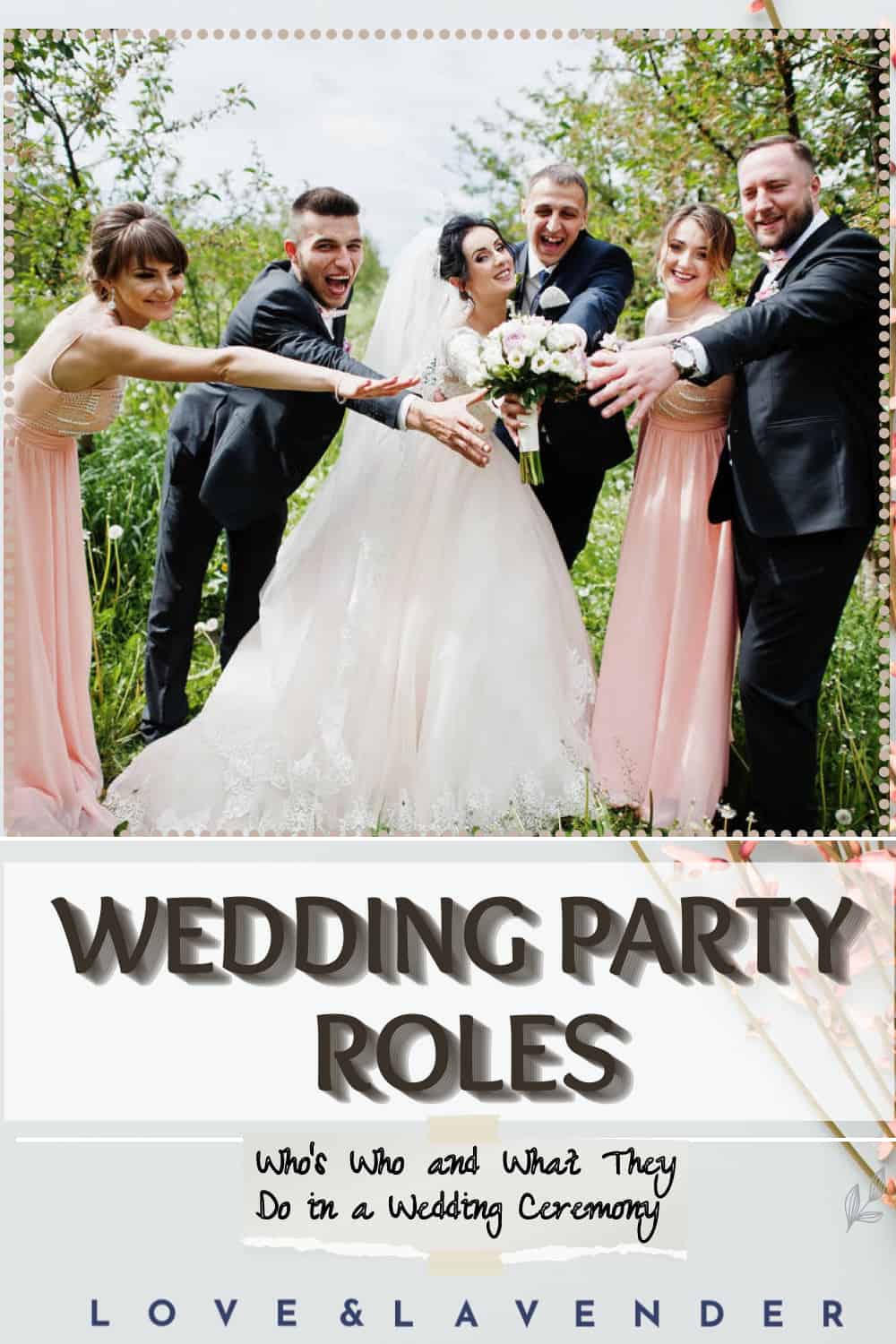
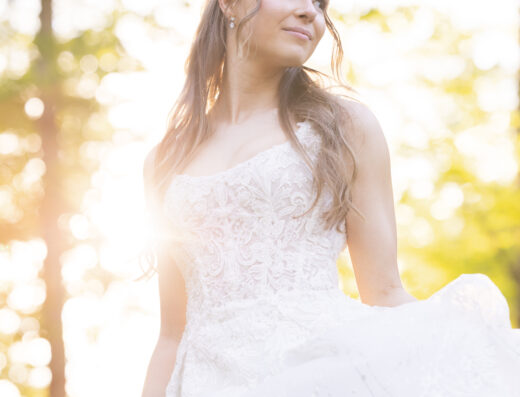
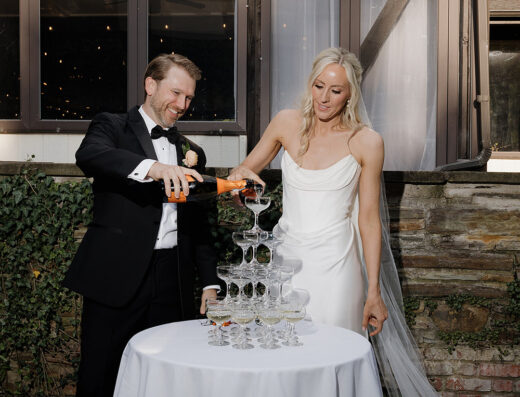


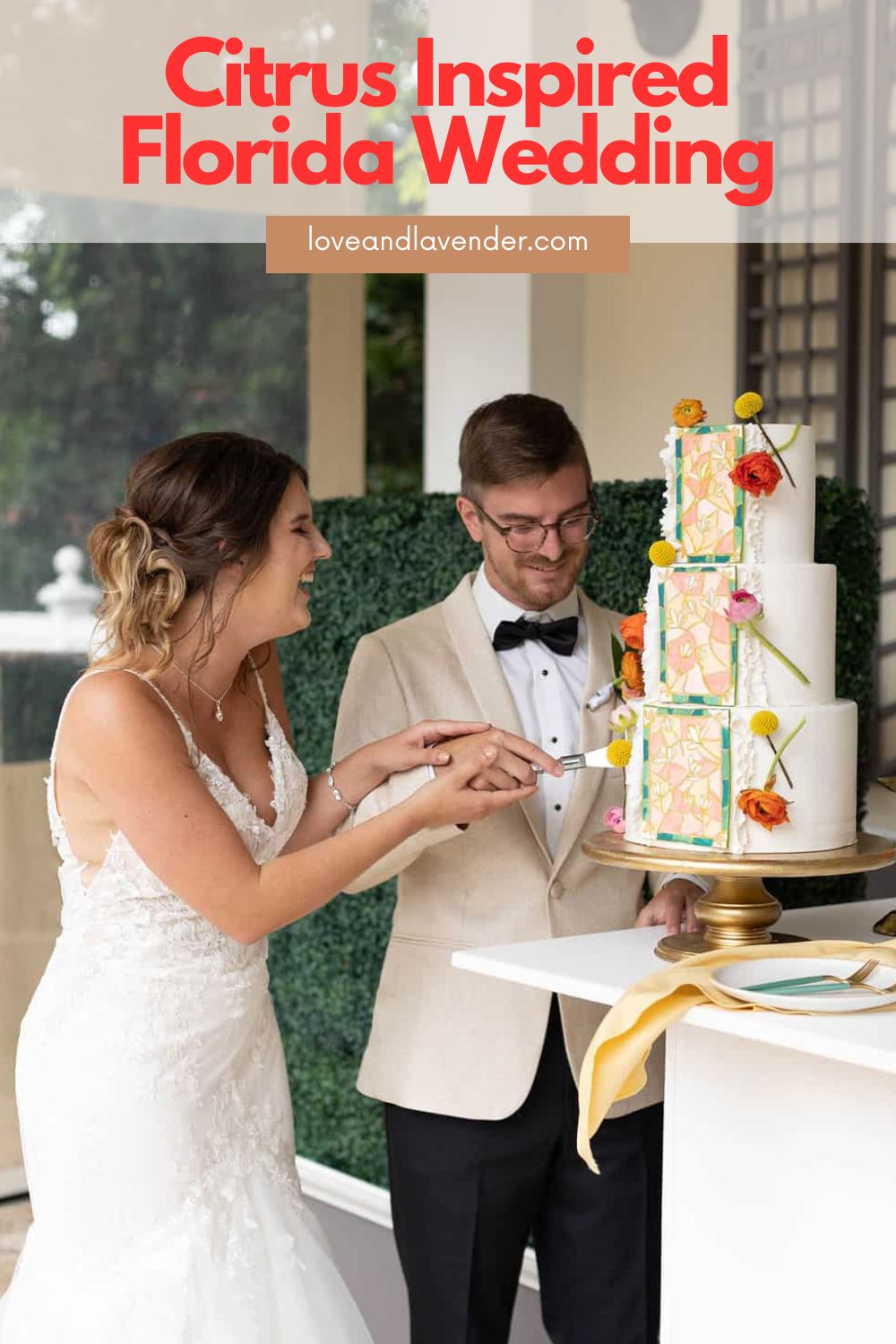
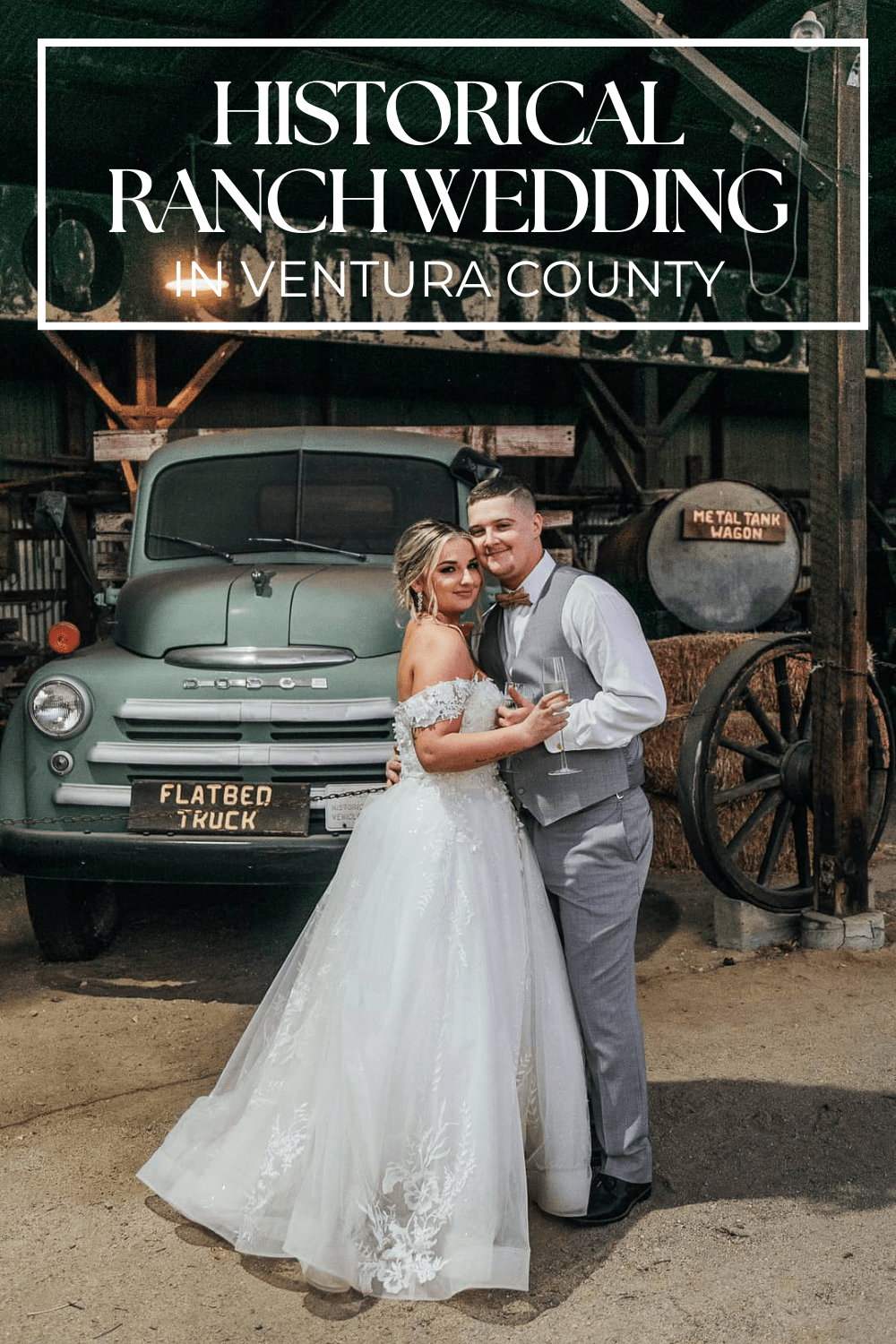


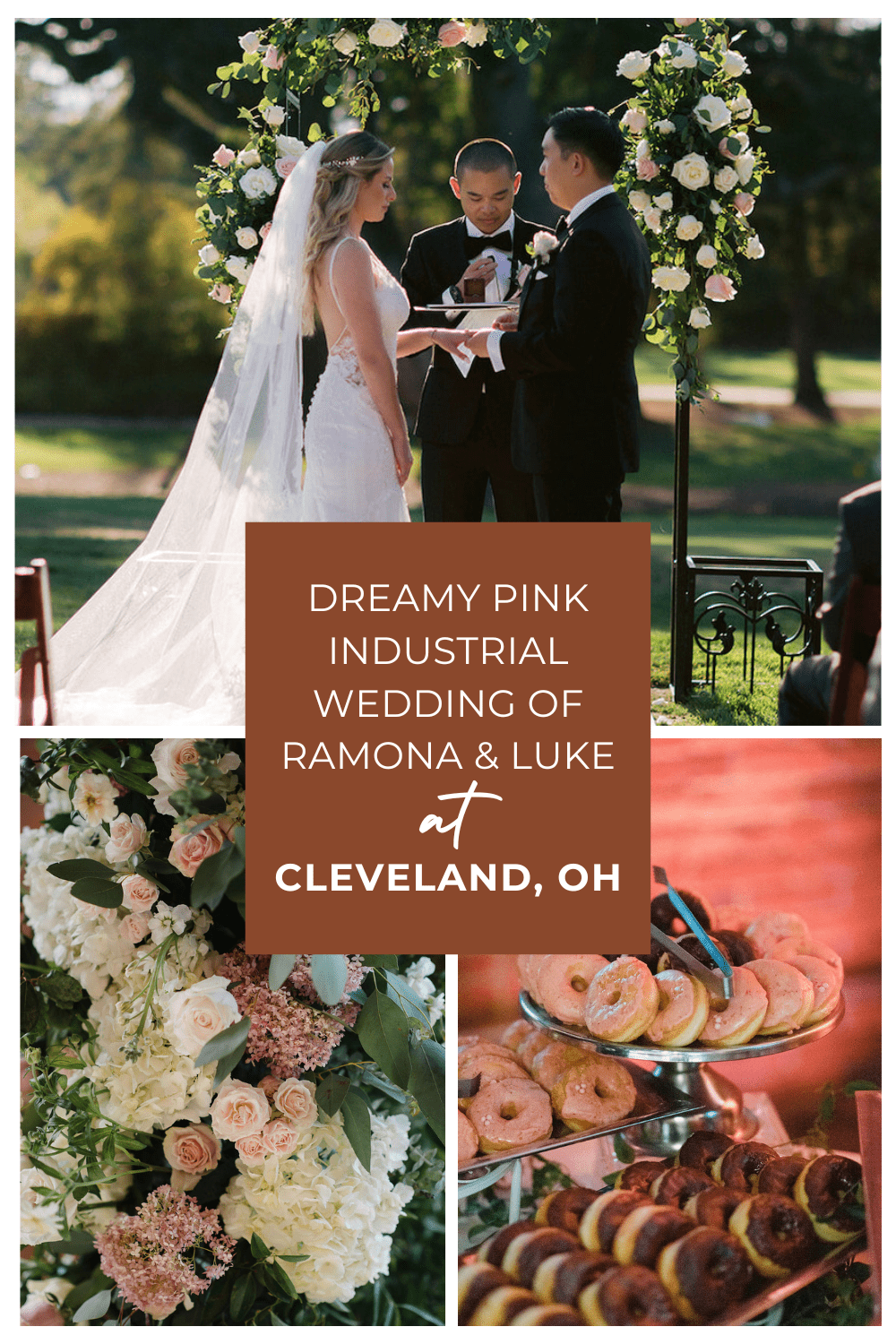
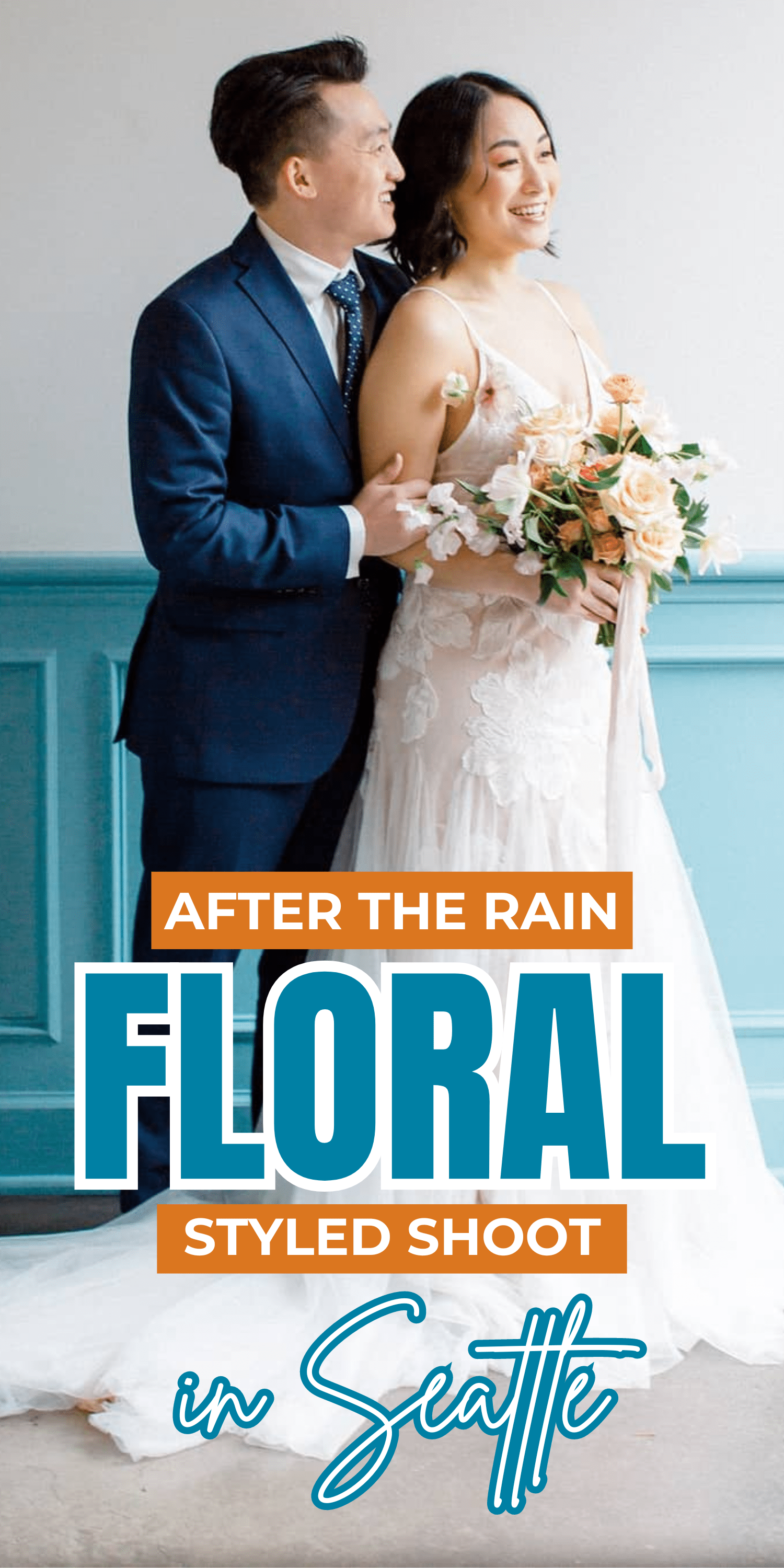


Leave a Reply